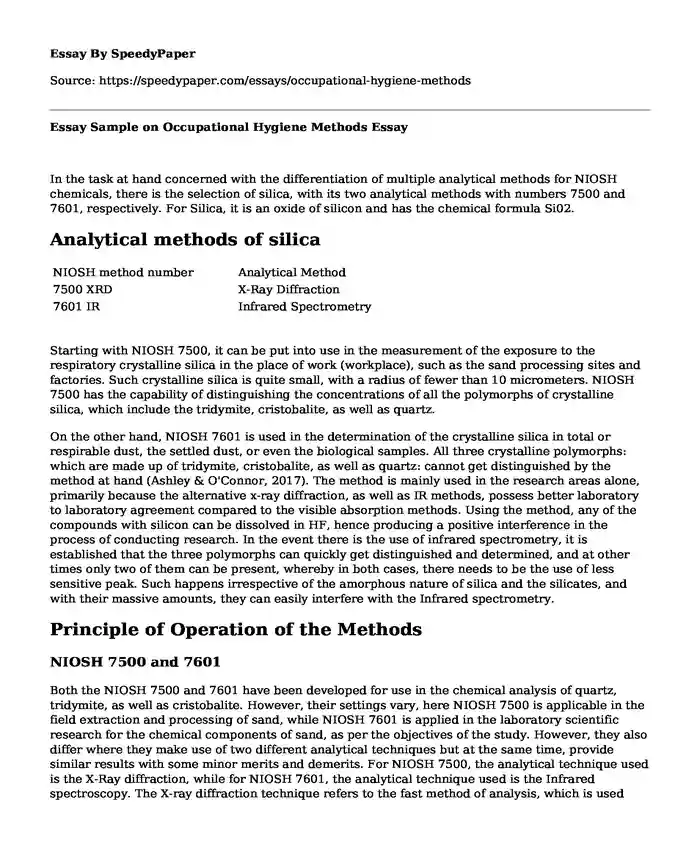
| Type of paper: | Course work |
| Categories: | Data analysis Chemistry |
| Pages: | 3 |
| Wordcount: | 587 words |
In the task at hand concerned with the differentiation of multiple analytical methods for NIOSH chemicals, there is the selection of silica, with its two analytical methods with numbers 7500 and 7601, respectively. For Silica, it is an oxide of silicon and has the chemical formula Si02.
Analytical methods of silica
| NIOSH method number | Analytical Method |
| 7500 XRD | X-Ray Diffraction |
| 7601 IR | Infrared Spectrometry |
Starting with NIOSH 7500, it can be put into use in the measurement of the exposure to the respiratory crystalline silica in the place of work (workplace), such as the sand processing sites and factories. Such crystalline silica is quite small, with a radius of fewer than 10 micrometers. NIOSH 7500 has the capability of distinguishing the concentrations of all the polymorphs of crystalline silica, which include the tridymite, cristobalite, as well as quartz.
On the other hand, NIOSH 7601 is used in the determination of the crystalline silica in total or respirable dust, the settled dust, or even the biological samples. All three crystalline polymorphs: which are made up of tridymite, cristobalite, as well as quartz: cannot get distinguished by the method at hand (Ashley & O'Connor, 2017). The method is mainly used in the research areas alone, primarily because the alternative x-ray diffraction, as well as IR methods, possess better laboratory to laboratory agreement compared to the visible absorption methods. Using the method, any of the compounds with silicon can be dissolved in HF, hence producing a positive interference in the process of conducting research. In the event there is the use of infrared spectrometry, it is established that the three polymorphs can quickly get distinguished and determined, and at other times only two of them can be present, whereby in both cases, there needs to be the use of less sensitive peak. Such happens irrespective of the amorphous nature of silica and the silicates, and with their massive amounts, they can easily interfere with the Infrared spectrometry.
Principle of Operation of the Methods
NIOSH 7500 and 7601
Both the NIOSH 7500 and 7601 have been developed for use in the chemical analysis of quartz, tridymite, as well as cristobalite. However, their settings vary, here NIOSH 7500 is applicable in the field extraction and processing of sand, while NIOSH 7601 is applied in the laboratory scientific research for the chemical components of sand, as per the objectives of the study. However, they also differ where they make use of two different analytical techniques but at the same time, provide similar results with some minor merits and demerits. For NIOSH 7500, the analytical technique used is the X-Ray diffraction, while for NIOSH 7601, the analytical technique used is the Infrared spectroscopy. The X-ray diffraction technique refers to the fast method of analysis, which is used primarily in the phase of identification of the crystalline materials and has the ability to provide the data on the individual dimensions of material cells. For the case of infrared spectroscopy, it concerns the analysis method, which deals in the infrared region of the electromagnetic spectrum, which is the light having long wavelength as well as low frequency compared to the visible light (Ashley, 2015). The two techniques have the ability to detect the various polymorphs of sand when used.
References
Ashley, K. (2015). NIOSH Manual of analytical methods 5th edition and harmonization of occupational exposure monitoring. Gefahrstoffe, Reinhaltung der Luft= Air quality control/Herausgeber, BIA und KRdL VDI und DIN, 2015(1-2), 7. Retrieved from https://www.ncbi.nlm.nih.gov/pmc/articles/PMC4545481/
Ashley, K., & O'Connor, P. F. (2017). NIOSH manual of analytical methods (NMAM). Retrieved from https://stacks.cdc.gov/view/cdc/50253/cdc_50253_DS1.pdf
Cite this page
Essay Sample on Occupational Hygiene Methods. (2023, Feb 27). Retrieved from https://speedypaper.net/essays/occupational-hygiene-methods
Request Removal
If you are the original author of this essay and no longer wish to have it published on the SpeedyPaper website, please click below to request its removal:
- Why Is the Supreme Court Case of Marbury v. Madison Important? Law Essay Sample
- Research of Hemoglobin Level, Free Essay Example
- Literary Essay Sample on The Yellow Wallpaper by Gillman
- Free Essay: History of Mathematical Puzzles
- Essay Sample: The Efficiency of an Automated Home in the Example of The Veldt Story
- Interview with an Elderly Person - Paper Example
- Free Essay Sample: Genetic Knowledge
Popular categories




